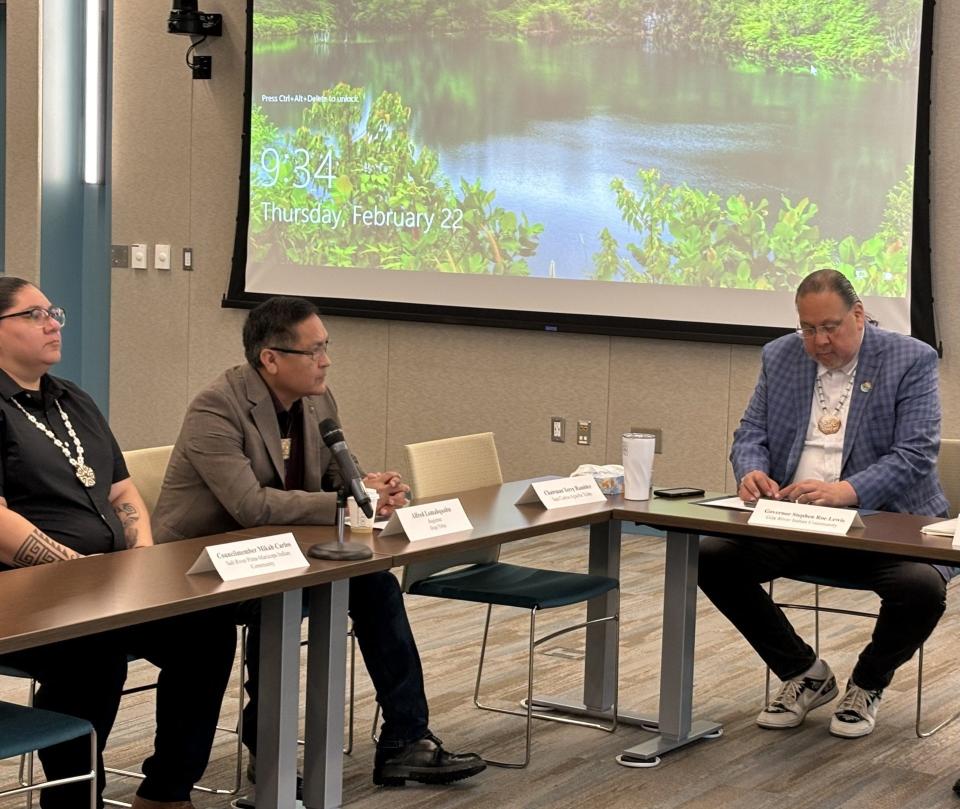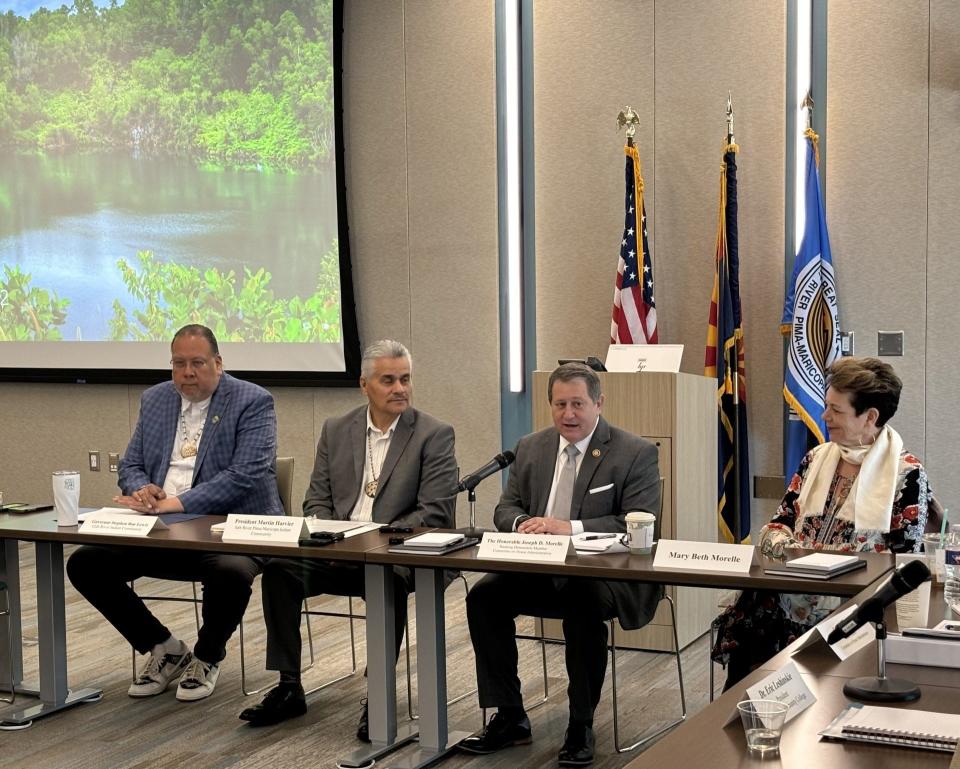Native voters still face serious barriers to voting in Arizona, leaders tell lawmaker
- Oops!Something went wrong.Please try again later.
Mikah Carlos, a council member for the Salt River Pima-Maricopa Indian Community, said in 2016 she attempted to vote using her tribal identification card, but was turned away by a poll worker telling her it wasn't permitted.
Carlos looked up the law regarding voter identification and showed the poll worker that it was allowed, but she was told again that she couldn’t use it. Another council member wasn't sure of the validity of her own vote being counted because there was an issue with voting machines.
These kinds of technical issues are common and, Carlos said, the impact on the community's ability to vote is undeniable.
“We are consistently having to do more work to make sure that our community members feel they are represented,” Carlos said Thursday. “It's not fair for our communities to have to invest so much to feel like we are being heard when there is so much writing on our voices being heard in the federal government.”

Carlos, accompanied by Governor Stephen Roe Lewis of the Gila River Indian Community, President Martin Harvier of the Salt River Pima-Maricopa Indian Community, and Vice President Alfred Lomahquahu of the Hopi tribe, spoke in detail about Native voting issues with U.S. Rep. Joseph Morelle, D-NY, who serves as the ranking member of the Committee on House Administration, during discussions Thursday at Scottsdale Community College.
Native voters face 'unique and substantial' barriers
Morelle had traveled through New Mexico and Arizona to host roundtable discussions with various tribal leaders and voters to discuss issues facing Native voters, ballot access and a path forward for the Native American Voting Rights Act.
The roundtable coincides with the ongoing efforts of the Committee on House Administration staff to prepare a report for release in June for the 100th anniversary of the Indian Citizenship Act. The report will underscore the necessity of federal legislation to guarantee ballot access for all Native Americans.

“I think it's easy when you’re in Washington to talk about issues and have some semblance of what you think is going on, but there is nothing that compares with actually coming out and meeting with people and hearing directly from them,” said Morelle. “We have seen the unique and substantial barriers that the Native communities face."
The testimony he is gathering will help to provide insight, context and examples of the adversity Native Americans face in voting. The congressman expects to hold a hearing regarding the Native American Voting Rights Act early next year.
While Carlos addressed the challenges she has encountered as a voter and recounted the experiences of others within her Salt River community, Lewis emphasized the historical journey of individuals within his Gila River Indian Community striving to secure voter rights. He underscored how the ongoing suppression of the Native vote persists despite these efforts.
“While the state law makes it hard for all Arizonans to vote, the impacts are disproportionately felt in our tribal communities,” said Lewis. “Especially with the limitations on mail ballot drop boxes.”
Requirements of physical addresses and third party ballot collections were other rules he said significantly hurt tribal members who live in rural areas.
“Native Americans, the first Americans, were the last to be granted citizenship in the United States,” said Lewis. “In June it will be 100 years since the Indian Citizenship Act passed making Native Americans full United States citizens. This is my grandparents' generation who transitioned from being non U.S. citizens on our own homelands to becoming citizens.”
Voting rights: Native people won the right to vote in 1948, but the road to the ballot box is still bumpy
Voting rights cases are not in the past
Twenty years after the Indian Citizenship Act, tribal members were still not allowed to vote in Arizona elections. Lewis said it was Gila River community members Peter Porter and Rudolph Johnson who brought litigation after being denied their right to register to vote in Pinal County.
“When they attempted to vote they were turned away by the country recorder, who deemed them unqualified for two reasons: because they resided on the reservation and therefore the county said they did not reside in the state of Arizona,” explained Lewis. “The county believed as American Indians, Porter and Johnson, were made wards of the federal government and thus not entitled to vote.”
This type of voting litigation isn’t something of the past. Just last September, the Gila River Indian Community received a favorable ruling in a lawsuit against Arizona regarding voting rights of tribal members and other plaintiffs. The suit involved House Bill 2492, a law signed by former Arizona Gov. Doug Ducey.
U.S. District Judge Susan Bolton ruled against the 2022 state law, which required proof of a physical address and other provisions that suppress Native American voters from casting ballots.
“I point this out to highlight how our voting history with the United States and Arizona started,” said Lewis. “The community was just involved in litigation last year against measures that would’ve made it harder for our members to vote. I also point out this history so that you have a greater appreciation and understanding of the historical perspective of why we take our right to vote, our voice, in local, state and federal elections so seriously.”
Lomahquahu pointed out the significance of the Native vote in the 2020 election outcome. He said there are parties and organizations creating barriers to the Native vote.
"Because of the Native vote, this state went from red to blue and it really opened up a lot of eyes of why and how Native American votes impact the state," said Lomahquahu. "And how we as tribes collaborate together to bring up our voting population to make a difference."
Morelle had visited with Navajo Nation leadership on Monday, where Navajo Nation Council Speaker Crystalyne Curley discussed how issues like public transportation, rural addressing and out-of-precinct voting have affected Navajo voters.
“Protecting the Native American vote means considering the unique challenges faced by Navajo voters,” Curley said. “The Nation has a strong interest in ensuring that Navajo voters have an equal opportunity to participate in the electoral process the same as other U.S. citizens."
Navajo Nation Council Delegate Curtis Yanito said communication for non-English speaking Navajo voters continues to create issues with deadlines and ballot drop-offs.
“Many of our elders forget when they have to mail back their ballots. When they get to the polls they’re told their ballots are outdated,” Yanito said. “Lack of proper communication is an issue.”
Morelle's visit to Scottsdale was his last stop on a weeklong tour to gather information for the Native American Voting Rights Act that will be introduced at a later date.
“Our purpose here today is both solemn and sacred,” said Morelle. “We believe the right to vote is the most precious right we have and all rights flow from it.”
Arlyssa Becenti covers Indigenous affairs for The Arizona Republic and azcentral. Send ideas and tips to arlyssa.becenti@arizonarepublic.com.
Support local journalism. Subscribe to azcentral.com today.
This article originally appeared on Arizona Republic: Native voters still face barriers to voting in Arizon, leaders say

